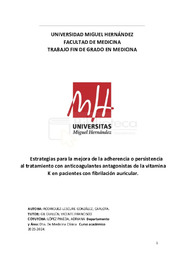Resumen :
INTRODUCCIÓN: La fibrilación auricular conlleva un riesgo de demencia, insuficiencia cardiaca, embolia sistémica y accidente cerebrovascular. Para prevenir los episodios aterotrombóticos, se utilizan anticoagulantes orales, destacando los antagonistas de la vitamina K (acenocumarol y warfarina). Los datos revelan que menos de la mitad de los pacientes de alto riesgo son tratados con terapia anticoagulante y más del 40% interrumpe el tratamiento dentro de los 12 meses. Teniendo en cuenta que el incumplimiento del tratamiento compromete su eficacia, es necesaria la investigación de estrategias para mejorar la adherencia efectivas y aplicables en la práctica clínica.
OBJETIVOS: Identificar estudios que reporten estrategias para mejorar la adherencia (o persistencia) de anticoagulantes orales antagonistas de la vitamina K, en pacientes con fibrilación auricular. Los objetivos secundarios son: conocer los métodos utilizados para valorar la falta de adherencia, la magnitud de la falta de adherencia, la relevancia clínica y la relación entre la adherencia y el grado de control terapéutico.
RESULTADOS: De los 103 encontrados en la búsqueda, solo 6 cumplieron los criterios de elegibilidad. Éstos fueron publicados desde 2013 hasta 2021. El diseño más frecuente fue el ensayo clínico aleatorizado (66,67%). La población más estudiada fue la de EEUU (33,33%). El ámbito de intervención más frecuente fue el hospitalario (50%). Las estrategias de mejora de adherencia engloban los siguientes: asesoría farmacéutica, el uso de diversas aplicaciones móviles y múltiples enfoques y métodos educativos por parte de médicos. Los métodos de medición de la adherencia reportados fueron indirectos. El riesgo de sesgo de la mayoría de estudios incluidos es alto.
CONCLUSIÓN: Las intervenciones estudiadas mejoran significativamente la adherencia a AVK en pacientes con FA en comparación con la práctica clínica habitual, salvo el uso de la aplicación MyChart. Es necesaria más investigación sobre la efectividad de estas intervenciones.
INTRODUCTION: Atrial fibrillation carries a risk of dementia, heart failure, systemic embolism, and stroke. To prevent atherothrombotic events, oral anticoagulants are used, with vitamin K antagonists (acenocoumarol and warfarin) being prominent among them. Data reveals that less than half of high-risk patients are treated with anticoagulant therapy, and more than 40% discontinue treatment within 12 months. Considering that non-adherence compromises its effectiveness, research into effective and applicable strategies to improve adherence in clinical practice is necessary. AIMS: To identify studies that report strategies to improve adherence (or persistence) to oral vitamin K antagonist anticoagulants in patients with atrial fibrillation. The secondary objectives are: to understand the methods used to assess lack of adherence, the magnitude of lack of adherence, clinical relevance, and the relationship between adherence and the degree of therapeutic control. METHODS: Of the 103 found in the search, only 6 met the eligibility criteria. These were published from 2013 to 2021. The most frequent design was the randomised clinical trial (66.67%). The most studied population was from the USA (33.33%). The most common intervention setting was the hospital (50%). Adherence improvement strategies encompass the following: pharmaceutical counselling, the use of various mobile applications, and multiple approaches and educational methods by physicians. Adherence measurement methods reported were indirect. The risk of bias of most included studies is high. CONCLUSION: The interventions studied significantly improve VKA adherence in AF patients compared to standard clinical practice, with the exception of the use of the MyChart app. Further research on the effectiveness of these interventions is needed.
|
 La licencia se describe como: Atribución-NonComercial-NoDerivada 4.0 Internacional.
La licencia se describe como: Atribución-NonComercial-NoDerivada 4.0 Internacional.
.png)
